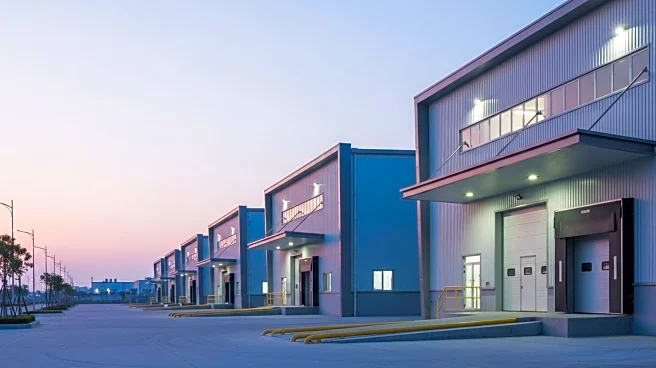What's Happening?
Vietnam is experiencing a significant increase in foreign direct investment (FDI), with registered FDI reaching $24.09 billion in the first seven months of 2025, marking a 27.3% year-on-year increase. Disbursed capital also rose by 8.4%, totaling $13.6 billion. The manufacturing sector is the primary beneficiary, accounting for 56.5% of total FDI. A notable trend is the preference for ready-built factories, which have become a strategic choice for international investors due to their speed and flexibility. This shift is partly driven by a new US tariff regime on Asian exports, effective August 1, which set duties at 20%, a significant reduction from the draft level of 46%. This tariff adjustment has restored investor confidence and reignited capital flows that had slowed earlier in the year.
Why It's Important?
The surge in FDI and the strategic shift towards ready-built factories highlight Vietnam's growing role in global supply chains. The new US tariff regime is crucial as it influences trade dynamics and investment decisions, making Vietnam an attractive destination for industries seeking cost-effective and flexible manufacturing solutions. This development benefits Vietnam's economy by enhancing its industrial capabilities and attracting high-tech industries. The shift also underscores the importance of Vietnam's competitive labor costs, strategic location, and stable policies, which are pivotal in the 'China 1' strategy, aimed at diversifying supply chains away from China.
What's Next?
Vietnam is likely to continue attracting significant FDI, especially in sectors requiring rapid deployment and flexibility, such as electronics and medical equipment. The ready-built factory model is expected to gain further traction, offering cost savings and adaptability to market fluctuations. As global supply chains continue to shift, Vietnam's industrial property market may see increased demand, potentially leading to further expansion of ready-built facilities. The ongoing trade tensions and tariff adjustments will continue to shape investment flows and strategic decisions by international firms.
Beyond the Headlines
The rise of ready-built factories in Vietnam reflects broader trends in global manufacturing, where speed and flexibility are increasingly prioritized. This model not only reduces upfront costs but also allows businesses to scale operations efficiently, aligning with the fast-paced nature of high-tech industries. Additionally, the focus on Environmental, Social, and Governance (ESG) standards in these facilities indicates a shift towards sustainable and responsible manufacturing practices, which could enhance Vietnam's reputation as a forward-thinking industrial hub.








